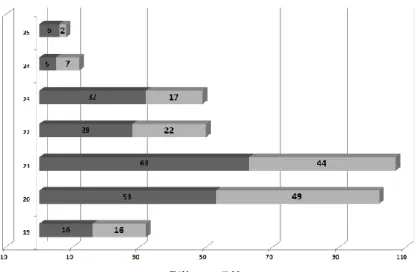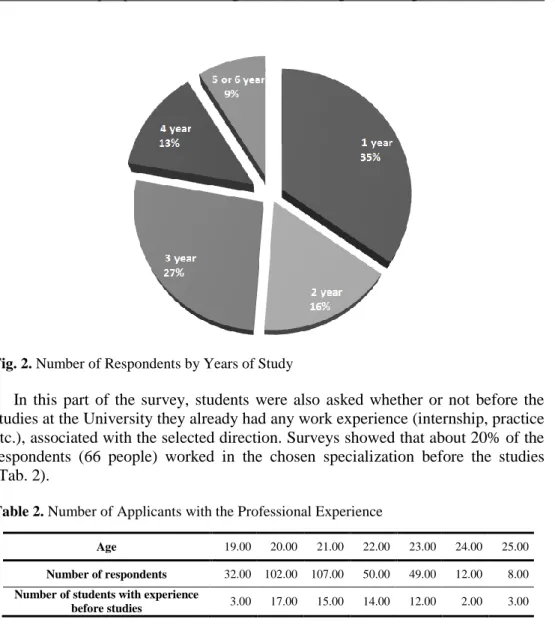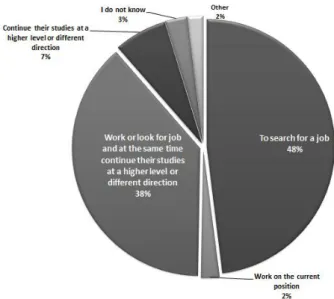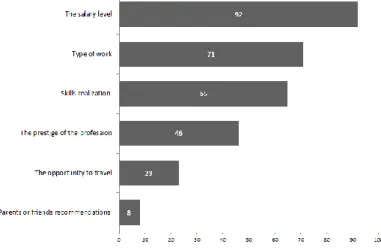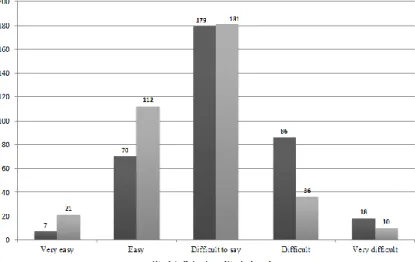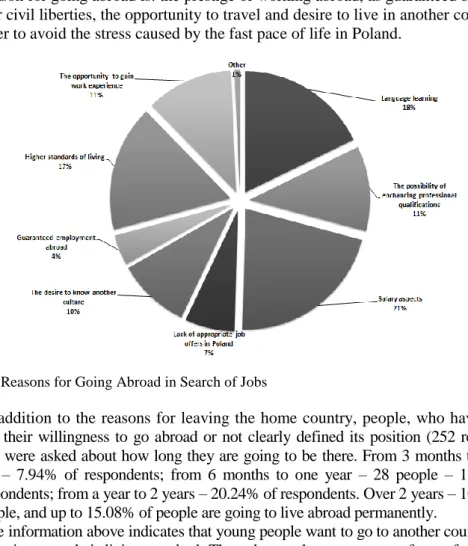PROFESSIONAL PROSPECTS OF POLISH
LOGISTICIANS IN THE LIGHT OF THE HIGHER
EDUCATION: STUDENTS’ OPINION RESEARCH
Irena Pawłyszyn*, Nina Rizun** and Halina Ryzhkova***
* Faculty of Engineering Management, Poznan University of Technology, Strzelecka 11, 60-965 Poznan, Poland, Email: irena.pawlyszyn@put.poznan.pl
** Faculty of Management and Economics, Gdansk University of Technology, Narutowicza 11/12, 80-233 Gdansk, Poland, Email: nina.rizun@zie.pg.gda.pl *** Department of Commodity Research and Commercial Entrepreneurship, Alfred Nobel
University, Dnipropetrovs’k, Naberezhna Lenina Str., 18, Dnipropetrovs’k, Ukraine, Email: gryzhkova@gmail.com
Abstract: The paper focuses on a topic concerning the students’ professional future. Students more often and more are prepared to leave the labor market. In addition to the ongoing higher education they get their education at a variety of courses and trainings; they increase their skills in workshops or attend internships and practices to become attractive candidates for the job in the eyes of a potential employer. At this point a number of questions raises, such as: do students choose their future profession consciously? what do they expect from the future profession? are they interested in working abroad after graduation? etc. According to the Forbes, logistician profession was in the top ten most popular professions in 2013 in Poland. That is why the objective of the paper was to identify the expectations of students who study Logistics at the Faculty of Engineering Management, Poznan University of Technolog.
Paper type: Research Paper Published online: 28 October 2016 Vol. 6, No. 5, pp. 379–392
DOI: 10.21008/j.2083-4950.2016.6.5.1 ISSN 2083-4942 (Print)
© 2016 Poznan University of Technology. All rights reserved.
Keywords: professional students future, logistics, labor market, employment, job
1. INTRODUCTION
The geographical location of Poland is determined by its status as a transit hub between Western and Eastern Europe (www.pap.pl/en). Therefore, in recent years the shift of the center of European logistics from Germany to Poland has been ob-served more and more. In addition, Poland has an access to the sea. For years the seaports have been more and more important transshipment points for the in- and outcoming global trade flow. That is why many international companies with headquarters in Poland place warehouses or distribution centers there. All these facts are good precursors of a promising future of the logistics industry (Business Services Sector 2014 in Poland, 2010).
In addition, the largest part of the EU funds (23.8 billion euros, or 27.8% of the total funds allocated by the EU to Poland at that time), will be spent on Polish transport infrastructure. The funds will primarily be aimed at sustainable develop-ment of the transport system and infrastructure improvedevelop-ments. Poland plans to expand or run at least 21 transshipment centers for the trans-European network links. In addition, the country plans to build 1,800 new roads by 2023 – mainly na-tional roads and highways. So far, thanks to the support of the EU, the nana-tional system of highways has tripled within the period from 2004 to 2013 (Report Action 3.1.2, 2010).
As a consequence of the above-mentioned trends, in Poland over the past 20 years a rapid growth in logistics profession popularity has been noticed. According to the Forbes (Top 10 occupations in 2013), logistician profession was in the top ten most popular professions in 2013 in Poland. In this context, Universities in Poland are making every effort to meet these industry trends due to the active de-velopment of logistics education programs (Logistics managers in Poland, 2012; Dembińska, 2013). However, it is still an open question of compliance of these areas to learning expectations of both students and the labor market; as well as employment opportunities of Polish Universities’ graduates to work abroad (Bar-wińska-Małajowicz, 2010; Polakowski, 2014; Czarnik & Konrad, 2012; Piróg, 2016; Bielecki, 2008).
This paper presents the views of the students towards their future careers. The purpose of this study was to investigate the expectations, competence and vision of the future – from the point of view of students at the Faculty of Engineering Man-agement of the University of Technology. Accordingly, the target research group included students of the bachelor and master degrees at the above-mentioned
Uni-versity. The research had 360 respondents – the students of Polish nationality. Tak-ing into consideration the difference in experience and preferences of part-timen and full-time students, only the students of full-time studies were selected for the research. The survey contained 19 questions and was divided into 3 parts: Respon-dent’s Profile; Professional Attractiveness; Employment.
A survey among students was carried out in February-May, 2016. The ques-tionnaire consisted of closed questions, single- and multiple-choice questions as well as questions with the 7-level scale weights, where 1 depending on the question means “strongly disagree/least attractive” and 7 means “strongly agree/the most attractive”. The questionnaires were handed out to students personally.
2. STUDENT’S VISION OF THEIR FUTURE IN THE LABOUR
MARKET
The choice of future profession is one of the most important life decisions. Ap-plicants choose a specific course of study for the future professional activity, guid-ed by many factors, including market trends, interests and occupational prguid-edisposi- predisposi-tion, the nature of job etc. (Musioł, 2011; Allen & Van Der Velden, 2007; Bańka, 2005; Barros, Guironnet & Peypoch, 2011).
Table 1. Data from the recruitment process at the Faculty of Management of the Poznan University of Technology
2013 2014 2015
Bachelors Masters Bachelors Masters Bachelors Masters
Course of study A p p li ca n ts E n ro ll ed A p p li ca n ts E n ro ll e d A p p li ca n ts E n ro ll ed A p p li ca n ts E n ro ll ed A p p li ca n ts E n ro ll ed A p p li ca n ts E n ro ll ed Logistic 1 736 121 283 94 1 544 123 187 86 1 425 152 226 99 Engineering Management 907 142 355 121 912 162 239 90 979 169 292 133 Security Engineering 697 59 188 58 538 58 110 56 479 65 121 47 Total 3 340 322 826 273 2 994 343 536 232 2 883 386 639 279
Management and production engineering is the direction that in the 2015/2016 academic year took the 11th place among the most popular directions in Poland (www.nauka.gov.pl, 2016). Department of Engineering Management of the Poznan University of Technology offers the applicants three fields of study: Logistics, Engineering Management, and Security Engineering, which prepare students for
the planning and control of production, reverse logistics, logistics management, production logistics and procurement, inventory management in supply chains etc.
The Table 1 presented above, contains data from the recruitment process at the Faculty of Management of the Poznan University of Technology of the last three years, which confirms the continued interest of young people in Logistics study direction. So let’s get to know students’ opinions about their expectations from entering the labor market.
2.1. Respondent’s Profile
As it was stated above – the number of respondents who took part in the survey is 360 people. Among them, 203 women (56%) and 157 men (44%). The research was provided among students of the first, as well as the second degree, therefore, the age of the respondents ranged from 19 to 25 years. Most of the respondents were between 20 and 21 years (102 and 107 persons correspondingly). Another sufficiently significant group includes students aged 19, 22 and 23 (32, 50 and 49 persons correspondingly). The smallest group contains students aged 24 and 25 (12 and 8 persons correspondingly). The share of surveyed men and women in different age groups is shown in Figure 1.
Fig. 1. The Number of Respondents in Certain Age Categories
Distribution of students enrolled in the different years of study is presented in Figure 2.
As we can notice from the Figure 2, students participating in survey, are mostly of the first years of study (78% of respondents). Small percentage of respondents (only 22%) are persons from 4–6 years of study.
Fig. 2. Number of Respondents by Years of Study
In this part of the survey, students were also asked whether or not before the studies at the University they already had any work experience (internship, practice etc.), associated with the selected direction. Surveys showed that about 20% of the respondents (66 people) worked in the chosen specialization before the studies (Tab. 2).
Table 2. Number of Applicants with the Professional Experience
Age 19.00 20.00 21.00 22.00 23.00 24.00 25.00
Number of respondents 32.00 102.00 107.00 50.00 49.00 12.00 8.00
Number of students with experience
before studies 3.00 17.00 15.00 14.00 12.00 2.00 3.00
The result suggests that young people seriously reflect on their future careers, and even undertaking the first steps toward the obtaining the practical skills before starting University education. From our point of view, this is due to primarily awa-reness of the realities of market competition, which requires contemporary poten-tial employees to possess specialized knowledge and experience.
2.2. Professional Attractiveness
In the second part of the survey, students were asked mainly about what they in-tend to do after university graduation (Fig. 3). The vast majority of respondents
(48%) indicated that they would start looking for a job. Another significant portion of students (38% of the respondents) declared that after graduation they will be working or looking for a job, and at the same time continuing their studies at a hig-her level or at anothig-her direction. Anothig-her 7% of the respondents have claimed that they will continue their studies at a higher level or different direction without at-tempting to find a job. On the other hand, 2% of the respondents indicated that they will work on the current position. In the question, students also could indicate their own answer; the option was used by 7 people (2%), 6 of whom stated that they want to start their own business, and one person remarked that he wants to go abroad under the program Work and Travel. The remaining 3% of students have not decided yet what they will do in the future.
Fig. 3. Student’s Decisions Regarding Graduation
Continuous education in chosen direction and gaining new knowledge and skills is an extremely important aspect. Therefore, comforting is the fact that more than half of the students (45%) answered that they want to combine the education and the possibility of a parallel search for a suitable job.
The next question had to establish whether young people have already made a decision about their future profession. The answers were divided perfectly in two halves for each of the variants – 50% of the respondents have decided, and 50% – have not yet made their decision about their professional future.
The third question concerned the attractiveness of different types of the future activities. In this case, students could evaluate the attractiveness of selected activi-ties on a scale from 1 to 7. As the most attractive form of the future activiactivi-ties
stu-dents identified their own business. Its average rating was 5.41 (on a 7-point scale). In second place was the office work with flexible working hours – the average is 5.31. The third and fourth places were taken by office work with full working time and freelancing 4.55 and 4.47 respectively. Shortened work week showed the aver-age attractiveness – 4.36. The least attractive proved to be the paperwork type with part-time (3.49), job-sharing (3.21) and working at the weekend’s system (2.44).
The fact that the students have chosen their own business as the most attractive activity is in some respects obvious. The own business is a greater freedom of deci-sion-making, way to implement their own ideas, know-how etc. But on the other hand, it is also a large range of obligations and responsibilities, which is often for-gotten. It should also be noted that a large number of respondents would be inter-ested in working time flexibility, which would allow relative freedom to plan their job and, as usually, correspondent with conduction of own business as well.
Another question, which also had the scale of weights, was to investigate the awareness of students about choosing their future profession. Average rating (6.0) showed that mostly students have chosen the University consciously and independ-ently, and fewer of them were influenced by their parents, friends or relatives (av-erage is 2.63). Students do not agree with the fact that their choice was strictly connected with the necessity to continue the family business (average is 1.39), as well as reject the statement that knowledge and skills are not important, and the most important is to obtain a diploma (average is 2.13).
Then the respondents were asked to identify the aspects which guided the choice of future profession, and therefore the study direction (Fig. 4).
Fig. 4. Aspects of the Students Future Profession Choice
The chart shows that the most respondents specified the level of salary as the most important aspect (283 respondents). The second and third places in the stu-dents choices was the type of the job (office work, business trips, traveling), which
is associated with the chosen profession (indication 191), as well as their skills realization (185 responses). The prestige of the profession is the aspect that took the fourth place (166 responses). The smallest number of specification received the aspect which is associated with traveling (71 responses) and the recommendations of family and friends (36 responses). It must be emphasized that none of the 360 people surveyed specified that the choice does not depend on them, which means that each person knew the main purpose of choosing.
Let’s examine the three most frequently chosen aspects. The level of salary in many cases is the most important aspect when choosing a profession; in connection with it the choice of students was not a surprise. However, apart from good earn-ings, the students also want to apply practical skills, in other words, to realize themselves in the professional area, which is extremely important and prestigious. And, by the way, the type of the job associated with logistics is not only interest-ing, but also ambitious and we will further mention some challenges that must be met. On the other hand, this type of job allows certain freedom of action and deci-sion-making, which creates its additional attractiveness.
The final question in this section was the one concerning willingness of respon-dents to conduct their own business. 100 people (28%) specified that they want to run their own business but in the context of extra job. 85 people (24%) would con-sider taking their own business activity in case of not finding a job. 56 respondents (16%) indicated that they do not take into account other forms of activity. 8 people (2%) declared that they already own their private business. While 20 respondents (6%) do not plan to open their own business, and the remaining 91 respondents (25%) do not have a specific opinion on this subject. As a generalization, a signifi-cant number of respondents specified that they want to pursue their own business. Quite a number of respondents indicate that they do not take into account other forms of activity.
2.3. Employment
The third section of the survey is addressed to the aspects related to finding a job in the home country and abroad.
Thus, the first two questions, which were addressed to students, have verified the difficulty of finding a satisfactory job in Poland and abroad, corresponding to obtained education. The results are combined in the Figure 5. Half of the respon-dents has problems with a clear opinion about these questions. Comparing answers of the other respondents we can note that more people indicate that finding a job in the home country is difficult or very difficult (104 answers), and only 77 respon-dents (21%) believe that finding a job in Poland is easy or very easy. When it is connected with finding a job abroad, 46 people think that it is difficult or very dif-ficult, but 133 persons (37% of respondents) believe that finding a job abroad is easy or very easy.
Fig. 5. Looking for Job in Poland and Abroad
These polling results are highly alarming. Statistical data show that in the last few years the number of people who emigrate abroad exceeds 2000 people per year (www.stat.gov.pl, 2016). The number is still increasing. As you can see, a lot of students are convinced that it is easier to find a job abroad than in their home coun-try. These views need to have some basis, which, as may be assumed, is the obser-vation of reality.
Then the students were asked whether they are interested in going abroad after graduation. 8.9% of respondents replied that they are definitely interested in going and 26.9% of respondents answered “probably yes”. In contrast, 4.7% of respon-dents consider that they definitely do not intend to leave the country in search of work, and 25.3% of respondents indicated that are not planning such a trip. The remaining 34.3% of respondents did not have a specific opinion (in comparison with Kmiotek & Polaszczyk, 2014, p. 53).
A total of 129 people declared that they are interested in going abroad. That is 36% of all respondents. It is therefore necessary to know what prompts young peo-ple to go to another country. This should have to verify another question survey (Fig. 6). It was a multiple-choice question (hence the number of responses is not equal to the number of respondents) and only covered people declaring their inter-est in traveling abroad, or undecided (totally 252 people).
As you can see from the chart the main purpose of those interested in going abroad is the paid work (57% of responses). And it is significant that these results agree with the research contained in the report prepared by the company Work Service for persons emigrating abroad (www.workservice.pl, 2016). As another important reason of the emigration process students pointed the fact of language learning (48%) and a higher standard of living abroad (45%). The reasons with an
average weight are: the opportunity to gain experience (30%) and professional de-velopment (30%). The reasons with the smallest weight are: the desire to learn an-other culture (26%), lack of suitable jobs in the home country (18%) and guaranteed employment abroad (11%). Those who have chosen the option “other” indicated that the reason for going abroad is: the prestige of working abroad, as guaranteed by law, greater civil liberties, the opportunity to travel and desire to live in another country, in order to avoid the stress caused by the fast pace of life in Poland.
Fig. 6. Reasons for Going Abroad in Search of Jobs
In addition to the reasons for leaving the home country, people, who have de-clared their willingness to go abroad or not clearly defined its position (252 respon-dents), were asked about how long they are going to be there. From 3 months to half a year – 7.94% of respondents; from 6 months to one year – 28 people – 11.11% of respondents; from a year to 2 years – 20.24% of respondents. Over 2 years – 10.32% of people, and up to 15.08% of people are going to live abroad permanently.
The information above indicates that young people want to go to another country in order to improve their living standard. They also see better prospects for professional development abroad. The data indicate that a significant group of respondents does not see prospects on the Polish labor market. But there is a worrying signal about the necessity of activating the professional development of graduates in Poland, because the lack of it can bring significant losses for the Polish economy.
Further the rest of all respondents were asked whether they already have knowl-edge about the company in which they will work and what the specialization they will have after graduation. 43 respondents (12%) specified that they know what
workplace and specialization they will have. However, the greater part of the re-spondents (88%) do not know yet where they will work.
The last question was to find out how students are sure of their employment af-ter graduation. More than half of the respondents indicated that they had not de-cided yet where they will work after graduation. The second group of students (36.9%) indicated that they know the company, in which they would like to work, but do not have the guarantee of employment at this moment. In turn, the 7.5% of students said they are absolutely sure of their employment, and 3.06% of respon-dents indicated that they had been already working in their chosen profession.
The results show that on the stage of studying at university young people, on the one hand, already are at a certain level of awareness of labor market as well as vision of their future; on the other – only a small part of the students have a job.
3. CONCLUSION
Analysis of the research results of the survey of students of Logistics at the Faculty of Engineering Management at the Poznan University of Technology gives grounds to formulate definite conclusions, namely:
• the significant group of students before choosing the study direction is try-ing to gain experience in a specific field of activity;
• the choice of the University is the independent students’ decision;
• after graduation, students are directed at looking for job, simultaneously continuing studies at a higher level or at the other direction;
• the most interesting form of activity for students is their own business and/or office work with flexible working hours;
• students have chosen the future profession primarily focusing on the ex-pected earnings;
• a lot of students know where they would like to work, but they are not en-tirely sure that they will have a job in that particular workplace;
• disturbing is the fact that a significant number of people believe that ob-taining work in their home country is more difficult than obob-taining em-ployment abroad;
• therefore, a lot of students declare their willingness to go abroad, including permanent stay there;
• they motivate the desire by: higher level of salary and living standard, as well as the ability to learn a foreign language.
Emigration of Polish graduated is becoming a more and more common phe-nomenon. Young people leave the country to find a better start for the future. The travel abroad is associated, first of all, with higher profits. It is necessary to pay attention to the fact that students choose the directions of studies taking into
con-sideration the possibility to get the desired payment in future. Thus Polish universi-ties face a difficult task – to reduce the trend of graduates leaving the country.
This reduction can be achieved by means of uniting the two “worlds” – the world of graduates and the world of employers. The desire to achieve this goal should be reflected in: the introduction of the brand new educational methods, provision of wider business knowledge, expansion of the offers of practices and internships, op-tions of flexible studying, as well as expansion of the range of interdisciplinary lessons, courses and workshops. Proper preparation of students to their professions is the most important aspect in the future choice of the profession.
Professional workshops and trainings in the process of academic education are a perfect addition to the professional attractiveness, which students can use in their interviews for work. It is necessary to remember that not only education is important, but also the experience, practices, internships etc. It comes out of the experience of many graduates that those who possess even the minimal possible experience, have higher chances to get the job. In this perspective, the understanding of the necessity to implement the above-mentioned changes in higher educational institutions is the key to the victory in the struggle for Polish youth.
In order to trace the trends and changes in the preferences and expectations of students, it would be reasonable to repeat this study within a certain period of time (for example, after 2–3 years).
REFERENCES
Allen J. & Van Der Velden R. (2007), Transition from higher education to work, Teichler U. (ed.), Careers of university graduates: Views and experiences in comparative perspectives, Springer, Netherlands, pp. 55–78.
Bańka A. (2006), Transnacjonalne poradnictwo zawodowe w kontekście zmian w wy-miarze europejskim. In: M. Kwiatkowski & Z. Sirojc (eds.), Edukacja dla rynku pracy. Problemy poradnictwa zawodowego, OHP KG, Warszawa, pp. 35–48. Barros C.B., Guironnet J.P. & Peypoch N. (2011), How to quickly get a job? The transition
from higher education to French labour market by a survival model, Applied Economics, Vol. 43, Issue 4, pp. 439–448.
Barwińska-Małajowicz A. (2010), Professional prospects for graduates from higher education institution – comparative analysis of the poll research results in Rzeszów (Poland) and Bielefeld (Germany), Acta Universitatis Lodziensis, Folia Oecono-mica, No. 242, pp. 59–74.
Bielecki P. (2008), Status absolwentów na rynku pracy. In: B. Minkiewicz & P. Błędowski (eds.), Absolwenci SGH na rynku pracy, OW SGH, Warszawa, pp. 89–105.
Business Services Sector in Poland 2014 (2010), Association of Business Service Leaders (ABSL), <www.absl.pl> [accessed: 16 July 2016].
Czarnik S. & Konrad T. (2012), Aktywność zawodowa Polaków. Praca zawodowa, wy-kształcenie, kompetencje, Państwowa Agencja Rozwoju Przedsiębiorczości, War-szawa, <www.pomorskiewunii.pomorskie.eu> [accessed: 25 July 2016].
Dembińska I. (2013), Analysis of the competencies Polish logistics managers in the light of research, Annals of the Oradea University, Fascicle of Management and Technological Engineering, No. 1, pp. 71–74, <www.imtuoradea.ro> [accessed: 23 July 2016].
Hanczarek T. (2014), Migracje zarobkowe polaków, <www.workservice.pl> [accessed: 12 July 2016].
Kmiotek K. & Polaszczyk J. (2014), Świadomość warunków i wymagań rynku pracy w opiniach studentów w gospodarce opartej na wiedzy, Modern Management Review, Vol. 19(XIX), No. 21(1), pp. 47–56.
Krupa P. (2015), Poland is becoming the logistics center of Europe, Polish Press Agency, Economic Service, <https://www.msp.gov.pl> [accessed: 12 July 2016].
Logistycy w Polsce (2012), Polskie Stowarzyszenie Menedżerów Logistyki, <www.antal.pl> [accessed: 11 July 2016].
Musioł K. (2011), Raport z badań preferencji licealistów, Uniwersytet Jagielloński, Kraków, <www.perspektywy.pl> [accessed: 12 July 2016].
Piróg D. (2016), Job search strategies of recent university graduates in Poland: plans and effectiveness, Higher Education, Vol. 71, No. 4, pp. 557–573.
Polakowski M. (2014), Youth Unemployment in Poland. Friedrich-Ebert-Stiftung, Inter-national Dialogue, Berlin, <www.library.fes.de> [[accessed: 14 July 2016].
Sobolewski A. (ed.) (2011), Elastyczne formy zatrudnienia – katalog dobrych praktyk, Pomorska Akademia Kształcenia Zawodowego, Szczecin, p. 5.
Springer A. (2011), Wybrane czynniki kształtujące satysfakcję pracownika, Problemy Zarządzania, Vol. 9, No. 4(34), pp. 162–180.
Top 10 occupations in 2013, <www.kariera.forbes.pl> [accessed: 10 May 2013].
Trade and transport between Central Europe and South-East Europe, Report Action 3.1.2, Needs of logistics market players (2010), <www.th-wildau.de> [accessed: 11 July 2016].
Wronowska G. (2013), Studenci Uniwersytetu Ekonomicznego w Krakowie na rynku pracy – badania ankietowe. In: D. Kotlorz (ed.), Regionalne i lokalne problemy rynku pracy, Uniwersytetu Ekonomicznego w Katowicach, Katowice, pp. 136–146. <www.nauka.gov.pl> [accessed: 12 July 2016].
BIOGRAPHICAL NOTES
Irena Pawłyszyn is an Assistant at the Chair of Production Engineering and Logistics
at the Faculty of Engineering Management, Poznan University of Technology. She teaches subjects involved organization and production management such as “Production and supply logistics”, “Warehouse designing”, “Supply chain manage-ment” etc. Her professional interests include logistics of production, Lean Manage-ment, Lean tools and clusters. She is the author and co-author of several publications in journals and monographs.
Nina Rizun is an Associate Professor and Candidate of Technical Sciences. She is
working at the Faculty of Management and Economics, Department of Applied Informatics in Management, Gdansk University of Technology, Poland. Her
research interests are the development of the simulation models of human decision-making processes and methodologies of decision-decision-making effectiveness evaluation, building the social capital evaluation models, especially for virtual enterprises, mathematical modeling and statistical analysis of economic and financial activity of the enterprises, using the social network analysis tools for assessing the intellectual capital of the company as well as unemployment of young people in as a result of problems of the educational system. She is the author and co-author of more than 65 papers in numerous journals of Europe. The main results of research are reflected in 11 patents for inventions and utility models.
Halina Ryzhkova is an Associate Professor and Candidate of Economical Sciences.
She is working at the Department of Commodity research and commercial entrepreneurship, Alfred Nobel University in Dnipropetrovs’k, Ukraine. Her research interests are the problems of implementation of logistics systems for the retail industry, research and examination of the quality of consumer goods, optimization product lines to retail establishments, market research and advertising. She is the author and co-author of more than 40 papers in numerous journals of Ukraine and one patent for inventions.
